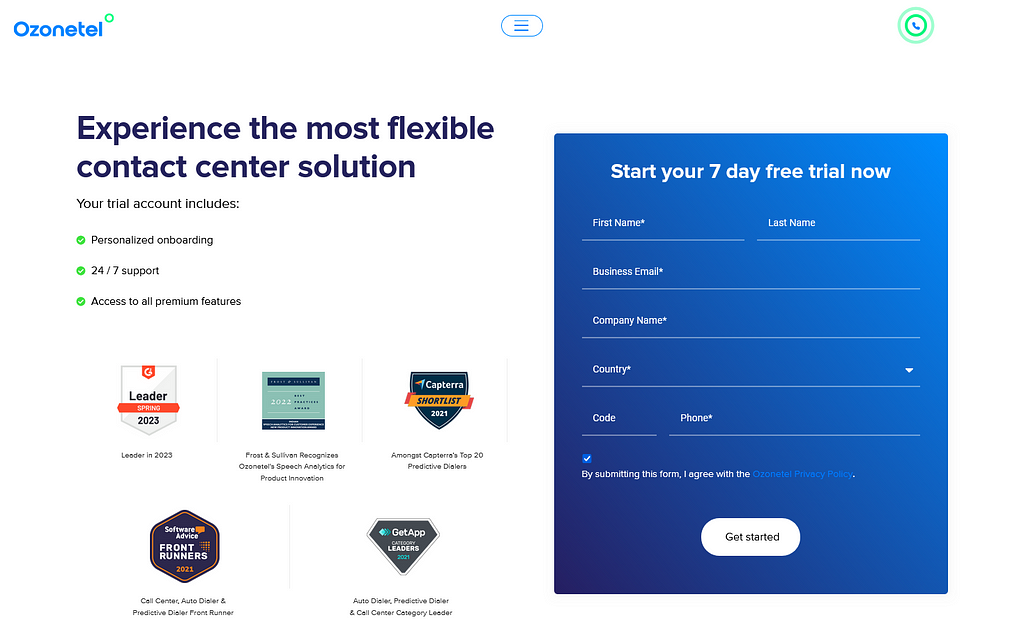- Resources
- The Ultimate Guide to Customer Service in the BPO Industry
The Ultimate Guide to Customer Service in the BPO Industry

Business Process Outsourcing (BPO) is a strategic approach that allows businesses to delegate specific tasks to external service providers, who have specialized resources and expertise in those areas. By outsourcing these tasks, businesses can streamline their operations, improve their efficiency, and focus on their core activities.
The BPO industry is growing rapidly, as more businesses realize the benefits of outsourcing. According to a report by Transparency Market Research, the global call center outsourcing market is expected to grow at a CAGR of 5.8% from 2021 to 2031, reaching a value of nearly $146 billion by 2031.
And customer service is one of the most popular and important segments of the BPO industry. It aims to provide excellent support and guidance to customers on behalf of a business. BPO customer service can help businesses achieve higher levels of operational excellence, customer centricity, and innovation. It can enable businesses to access new markets, enhance customer loyalty, and create new revenue streams.
In this article, we will explore:
- 1. What is BPO Customer Service?
- 2. Why Businesses Choose to Outsource?
- 3. How do Customer Service BPOs Work?
- 4. Key Benefits of Customer Service BPO
- 5. How to Choose the Right Customer Service BPO
- 6. Major Customer Service Challenges in BPO Industry
- 7. How To Overcome BPO Customer Service Challenges
- 8. Deliver Superior Customer Experiences with Ozonetel
What is BPO Customer Service?
Customer Service BPO, or Business Process Outsourcing, is a form of outsourcing where a company contracts its customer service operations out to another organization. The day-to-day handling of customer inquiries and complaints is handled by this external service provider rather than in-house employees to alleviate internal workloads. A BPO will typically specialize in handling a specific type of customer service and virtually always has more infrastructure in place than the company hiring it.
Services range from provider to provider but usually include things like:
- Inbound and outbound call center services
- Email/online support
- Social media inbox management
- Live chat support
- Virtual assistant services
Why Businesses Choose to Outsource?
Businesses often turn to outsourcing as a smart strategy to boost efficiency and focus on core operations. Here are the key reasons why businesses choose to outsource.
Cost Efficiency
By outsourcing, a business can significantly cut down on costs, making a notable impact on its bottom line. According to Shortlister, a notable 57% of companies opt to outsource their processes, leading to substantial savings. Data shows that companies can save up to 50-60% on their operational expenses by choosing this route. It’s like finding a more affordable yet effective way to handle customer inquiries and issues.
Access to the Global Talent Pool
Imagine having access to a team of experts from all around the world. That’s another perk of BPO customer service. Outsourcing allows businesses to tap into a diverse and skilled global talent pool. T This is a key advantage as over 70% of businesses recognize outsourcing for tapping into specialized skills. By leveraging this global expertise, businesses ensure that customer service is handled by professionals with specific competencies, ultimately elevating the overall quality of service provided.
Focus on Core Activities
Businesses have a lot on their plates, right? Outsourcing lets them focus on what they’re best at – their core activities. About 57% of businesses choose outsourcing so they can concentrate on the things they do exceptionally well. This shift not only enhances operational efficiency but also fosters an environment conducive to innovation, driving growth and competitiveness in the market.
Quick Implementation and Flexibility
Outsourcing offers businesses the advantage of quick implementation and flexibility. When faced with sudden increases in workload or the need for rapid expansion, outsourcing lets them use the skills and resources of other people who are experts in their fields. This way, service providers can adapt to changing business needs, ensuring that companies maintain agility and responsiveness in dynamic markets without compromising efficiency.
Risk Mitigation
Outsourcing can also help businesses mitigate risks. External service providers often assume certain risks associated with specific tasks, such as regulatory compliance, technology upgrades, and market fluctuations. This allows businesses to share the burden of risk with experienced outsourcing partners. This way, businesses don’t have to worry about these challenges and uncertainties as much.
24/7 Customer Support
BPO customer service allows businesses to offer customer support anywhere anytime. They no longer have to worry about time zones or different locations. This 24/7 availability enhances customer satisfaction and ensures timely resolution of issues. According to a Microsoft report, 66% of consumers globally expect real-time responses, and outsourcing enables businesses to meet these expectations efficiently, fostering positive customer experiences.
How do Customer Service BPOs Work?
Customer service BPOs work similarly to other outsourced business solutions in that you pay them a monthly fee with the understanding that they’ll assume predefined work or responsibilities for you. In this case, the help is specific to customer service operations, which can range from handling basic inquiries and complaints to more complex tasks such as order processing and technical support.
The process typically begins with a consultation between the company looking to outsource its customer service operations and the BPO provider. The BPO provider takes this time to understand the company’s needs and expectations, as well as their customer base and existing processes. From there, the BPO provider will create a customized plan that outlines how they will handle customer service for the company.
It’s then a matter of familiarizing staff with that plan. The agents employed by BPO companies are assigned ‘clients’ to work with and undergo training to understand the company’s products or services, as well as their brand values and customer service protocols. This is where the quality of the BPO you’ve chosen starts to shine through, as not every provider takes the training phase as seriously as they should.
Answers on performance will become really apparent once they start handling calls. BPOs use call center technology to manage and track all customer interactions, usually based on their clients’ preferred KPIs. The service continues per the terms of the contract with the BPO provider, with regular evaluations and reports shared between them and the company.
Key Benefits of Customer Service BPO
Now that we’ve answered the obvious question of ‘How do customer service BPOs work?’, it’s time to address another, similarly worded one – ‘DO customer service BPOs work?’
The answer is yes, they can. BPO in customer service offers a host of advantages for businesses looking to streamline their operations and increase the quality of their interactions with customers. Take a look at six key benefits of having BPO customer support below.
Scalability
Delegating the responsibilities of customer service to an external team through BPO means having the option to easily adjust operations to meet changing needs. Ask yourself – Can your current team easily grow or shrink as needed? Will staff need to be laid off if there’s a dip in demand? Do you have qualified talent at the ready should more calls come in? The answer is usually no. BPOs are abundant in resources, employees, and technology that can smoothly adapt to a broad range of changes in circumstance. For one monthly fee, you can operate with the confidence of knowing that whether you need support, you can rely on your outsourcing partner to handle it.
Access to Efficient Technology
Outsourcing providers have the resources to invest in robust technology that can significantly improve your customer service operations. These tools allow for efficient and streamlined communication between customers, agents, and management. Good BPO customer service vendors go the extra mile of investing in advanced solutions that incorporate efficiency-boosting tools like Artificial Intelligence, (AI), Machine Learning (ML), and Robotic Process Automation (RPA). These technologies enhance agent productivity by enabling them to handle tasks more efficiently and accurately, leading to improved customer service.
Loyal Customers
To expand upon the last point, efficient processes and seamless call experiences have an undeniably positive effect on customer satisfaction. When people feel that their issue is respected and resolved in a timely manner, they are much more likely to see your company in a positive light. The numbers prove it; Khoros reports that an overwhelming majority (83%) of customers are more loyal to brands that efficiently respond to and resolve their complaints. The importance of speedy resolutions to customer service quality and long-term loyalty is even more pronounced in the age of social media, where negative experiences can spread like wildfire.
Data-Driven Insights
Outsourcing customer service not only helps with customer support but also makes it easier to gather and derive value from customer data. BPOs use software analytics to identify key trends and patterns in customer behavior, allowing companies to make more informed decisions when it comes to product development, marketing strategies, and overall business operations. Some even make use of predictive analytics, which does the extra work of forecasting future customer needs and behaviors for decision-makers.
Enhanced Focus
Like all forms of outsourcing, BPO customer service allows companies to focus on their core competencies. Every business prioritizes customer service, but every organization has the bandwidth to handle it well while simultaneously delivering on other important aspects of their operations. Outsourcing customer service frees up internal resources and allows businesses to dedicate more time, energy, and resources toward growth and development.
Global Market Presence
While managing an in-house team would limit their talent pool to a specific geographic location, outsourcing allows companies to tap into a global network of skilled professionals. This not only increases the availability of agents but also provides access to multilingual individuals who can cater to customers from different parts of the world.
How to Choose the Right Customer Service BPO
Remember earlier, when we said that not all BPOs are made equal? It’s worth emphasizing the statement once again because choosing the right BPO call center solution can make or break your customer service strategy and will have a significant impact on your business. Here are some key factors to consider before zeroing in on a BPO customer service partner.
Here are some tips to help you choose the right BPO for your business:
Assess Your Needs
Understand what specific customer service tasks you need assistance with and what your current infrastructure lacks. This will help you identify the type of BPO that best fits your needs.
Do Your Research
Don’t just go with the first BPO provider that comes up in a Google search. Take the time to research and compare different providers, their services, and their reputation in the industry.
Ask for Referrals
Reach out to other businesses that have used customer service BPOs before and ask for referrals or recommendations. Their experiences and insights can help you make a more informed decision.
Consider Location and Language
If your business caters to international customers, it’s important to choose a BPO that has agents who are fluent in the languages of your target market. It’s also worth considering a BPO with agents in different time zones to provide round-the-clock customer service.
Evaluate Technology and Tools
A good BPO should have the latest technology and tools to efficiently handle customer inquiries. This can include chatbots, omnichannel support, and customer relationship management (CRM) software.
Examine Service Quality
The BPO should provide high-quality customer service. Look for certifications, awards, or recognitions that indicate their dedication to delivering high-quality service.
Factor in Cost
While cost is a significant factor, it shouldn’t compromise the quality of service. Consider the long-term value and ROI offered by the BPO, rather than focusing solely on the initial price.
Define Performance Metrics
The BPO should have clear performance metrics to measure their success. These could include First Call Resolution (FCR), Average Handle Time (AHT), and Customer Satisfaction (CSAT) scores.
By assessing these factors and conducting due diligence, you can select the right customer service BPO partners that can help you deliver exceptional customer service, so choose wisely.
Major Customer Service Challenges in BPO Industry
Navigating the customer service landscape in the BPO industry comes with its share of challenges. Here are five major challenges faced in BPO customer service:
Language and Communication Hurdles
Imagine talking to someone who speaks a different language or has a different way of saying things. In BPO, language differences can be a big challenge. Communicating clearly is crucial in customer service, and when there’s a language barrier, it can lead to misunderstandings and frustration. Companies need to find ways to bridge these gaps, like providing language training for their teams.
Cultural Differences
Just like language, cultural differences can pose a challenge. Different cultures have different ways of expressing and understanding things. For example, what might be considered polite in one culture might be seen differently in another. Companies in the BPO industry need to be aware of these cultural nuances to ensure smooth interactions with customers from diverse backgrounds.
Data Security Concerns
Protecting customer information is a big responsibility. In BPO, where customer service is often handled by external teams, ensuring data security can be challenging. Businesses need strong protocols to keep customer data safe and build trust. Data breaches can not only harm customers but also damage the reputation of the company.
High Employee Turnover
Imagine if you had a different person answering your questions every time you called customer service. High employee turnover, where staff changes frequently, is a common challenge in BPO. 50% of executives identify talent acquisition as a top challenge in meeting their organization’s strategic priorities, found a 2022 study by Deloitte . This can impact the consistency and quality of customer service. Companies need strategies to retain their skilled employees, like offering good training and creating a positive work environment.
Meeting Service Level Agreements (SLAs)
In BPO, there are often agreements called Service Level Agreements (SLAs) that outline the level of service that should be provided. Meeting these SLAs consistently can be a challenge. It involves juggling multiple tasks, handling a high volume of inquiries, and ensuring that each customer gets the attention they deserve. Companies need effective management and workflow systems to keep things running smoothly.
How To Overcome BPO Customer Service Challenges
Both BPO providers and the businesses that hire them can benefit from adopting a few proactive measures for call center quality.
These include:
Training Programs
By incorporating thorough language training programs for customer service representatives, you can guarantee that your teams possess a proficient understanding of the languages they use, minimizing the potential for miscommunication.
Translation Tools
Advanced translation tools to bridge language gaps can assist in real-time communication to ensure that customers and service representatives understand each other clearly.
Clear Communication Protocols
Foster open and effective communication within your team by establishing clear rules. Emphasize the use of clear and concise language, avoiding confusing jargon.
Cultural Sensitivity
Cultivate a more inclusive and empathetic approach to customer service by providing cultural awareness training for BPO teams. This valuable training will help employees understand and respect diverse cultural norms, leading to improved interactions with customers.
Internal Forums
Foster an inclusive work environment by encouraging open communication among team members to discuss and share insights on cultural differences. This promotes a collaborative and culturally aware work environment.
Strong Security Protocols
Implement encryption and regular monitoring to protect sensitive customer data. All employees should be well-versed in security protocols to create a culture of data protection.
Regulatory Compliance
Stay updated on data protection regulations and compliance standards like the General Data Protection Regulation (GDPR) and the California Privacy Rights Act (CPRA) as they evolve. Adhering to these rules will insulate your business from the risk of penalties while also promoting customer trust.
Deliver Superior Customer Experiences with Ozonetel
With Ozonetel’s unified CX platform, scaling your BPO operations becomes a breeze, allowing you to meet industry demands seamlessly without sacrificing quality of service (QoS). It offers rapid deployment and migration, making it possible to have a contact center operational in hours. It provides flexible deployment options and compatibility with on-premise PBX. Ozonetel is also cost-effective, helping businesses reduce their total operational costs by 50%.
The platform supports omnichannel engagement, allowing seamless interaction with customers across various channels. It features an open API platform for integration with other business solutions, real-time monitoring, and insights with over 100 live reports, AI-powered speech analytics, and more. It also empowers agents with insights into customer sentiment and demographics. Ozonetel ensures seamless integration with various business applications, agility to switch to remote working in minutes, and best-in-class support, providing a single point of contact from sales to deployment, onboarding, and support.
Conclusion
In conclusion, BPO customer service is a valuable asset for businesses that want to outsource their support functions and increase their efficiency. However, it also comes with some challenges that require proactive and innovative solutions. By addressing these challenges effectively, businesses can ensure customer satisfaction and loyalty.
Ready to take control of your call transfer
experience for better CX outcomes?
Frequently Asked Questions
Looking ahead, the BPO customer service industry shows great promise. We’re witnessing a shift towards more personalized customer experiences, thanks to trends like intelligent automation and digital transformation. Moreover, initiatives focused on reskilling and upskilling are crucial to meeting the evolving expectations of customers.
Good customer service in BPO provides responsive, efficient, and personalized assistance to customers professionally. It involves actively listening to customer concerns, addressing their needs promptly and effectively, and maintaining a positive attitude throughout the interaction.
Customer service is crucial in BPO as it directly impacts customer satisfaction, retention, and brand reputation. It helps build trust and loyalty among customers by providing them with a positive experience. Good customer service also leads to increased sales and profitability for the business.
The role of customer service is to provide support to customers and prospects on behalf of the business. Customer service involves answering questions, resolving issues, processing orders, providing information, handling complaints, delivering feedback, and ensuring customer satisfaction.
Prashanth Kancherla
Chief Operating Officer, Ozonetel Communications
Over the past decade, Prashanth has worked with 3000+ customer experience and contact center leaders...
Chief Operating Officer, Ozonetel Communications
Over the past decade, Prashanth has worked with 3000+ customer experience and contact center leaders to comprehensively understand the need for effective and efficient customer communications at every step of their journey with a brand. Deeply embedded in today’s CCaaS ecosystem, he has been instrumental in Ozonetel's growth and contributed in various roles including product management, sales, and solution architecture.







